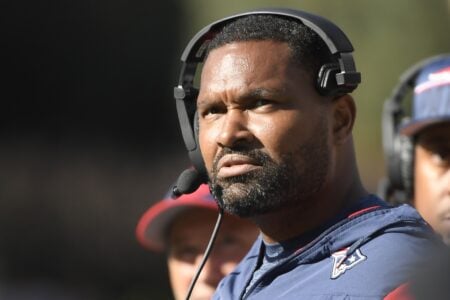This is the entire point and the reason why the protests worked. No one would care if they weren't made to feel a certain way by the protests. There would be no attention or conversation.
The flag is a symbol of the country in general and these black players feel like the country in general doesn't respect them. Not standing = treating the symbol with the same respect as you feel the symbol treats you with for some.
I also find it interesting that only now that people are kneeling have I seen the conservative types acknowledge the possibility of police brutality being a problem: "Maybe there is police brutality, but they're doing it the wrong way..." when previously, all I ever saw from the same people was "yeah but black on black violence!!!!"
There will always be excuses made as to why a form of protest isn't right. It's just about always nothing more than virtue signaling that you think they should shut up.
It worked?????????????
There is no attention to the cause, in fact most people dont really even know what the message is.
The attention, that should be on the cause they are protesting for, is only on the moment they choose to protest.
They hurt their own cause by having people focus on the disrespect they are showing by choosing that moment to try to make a statement, that doesnt get heard because the conversation is only about standing or kneeling.
Your anecdotal example that conservative people suddenly agree there is police violence because of kneeling for the national anthem is comical.
There is both examples of police brutality and black on black violence in this country. It was there and it was publicized long before Kaepernick decided he needed a way to get people to pay attention to him again. Football players kneeling didn't educate a single person on the existence of social issues. The 1% of Americans who had their head buried in the sand and didn't see what was happening still have their head buried in the sand. Your implication that racists had a sudden epiphany when they saw a football player disrespect the anthem and it made them realize, oh my god police shoot people is ludicrous.
Unfortunately the league is being run by an idiot, and the players have no organization to this mission whatsoever.
What needs to happen is first they need to take the negativity away from their demonstration by not doing it at a time that offends innocent, thoughtful, honest people. Second they need to create and communicate a clear message of just what it is they want. (Black people are oppressed and get shot is not a clear message of what you want). Then they need to choose the proper forum. If they feel silently kneeling gets some kind of message across (which I happen to not think) then when they meet with Goodell they need to tell the idiot to stop spewing crap and do something. Goodell now says they want all the players to stand, but they can do what they want. So are they wrong to kneel? Must be because he wants them to stand right? Then he criticizes politicians for interfering with his league, then submits a political letter to congress on NFL letterhead. Then they need to tell him to establish a moment of silence separate from the National Anthem something like for the furthering of social issues that are near and dear to the players and the league, and in memory of all victims of violence. Then they need to decide what they want. The list could include:
Lobbying regarding laws such as parole reform, mandatory sentencing, etc. Why can't the CBA have a provision for the league to hire lobbyists to represent the concerns of the players?
A call to put body cameras on all police, at least starting in high crime inner city areas
A program where the league, players and NFL donate money, 1% of every check, matched by the league would be what, 100,000,000 a year, for improving education in the hood, or job training programs, crime prevention programs, etc etc.
Call for each NFL city to appoint a victims rights department who will take the side of the victim in investigation of police violence.
There are probably dozens of other things that could have a real impact that could be added to the list, and then this movement would actually have an impact instead of simply causing people to argue about the right to kneel vs the disrespect for the flag.


















